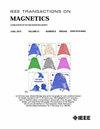用于超高能效非常规计算的磁约束电子学:综述
IF 2.1
3区 工程技术
Q3 ENGINEERING, ELECTRICAL & ELECTRONIC
引用次数: 0
摘要
随着边缘智能的快速发展,异构结构中的特定领域计算机很可能成为主流。对设备技术和计算模式的明智选择可以大幅降低此类计算机的尺寸、重量和功耗(SWaP),同时还能使其完全自主(无时钟)并抵御恶意攻击。在此,我们回顾了一种新兴设备技术--磁应变电子学--在为各种计算范式实现极高能效硬件方面的前景:神经形态、概率、贝叶斯信念网络、玻尔兹曼机(BM)和伊兴机(IM)、用于深度学习网络的矩阵乘法器,以及用于 p 计算的可重构随机神经元。磁应变电子学有两个重要特点:非挥发性和极低能耗,这有利于边缘处理和硬件网络安全。我们讨论了利用磁应变电子学实现的一些非常规计算范例,同时指出了所有情况下的显著能效。本文章由计算机程序翻译,如有差异,请以英文原文为准。
Magnetic Straintronics for Ultra-Energy-Efficient Unconventional Computing: A Review
With rapidly increasing edge intelligence, domain-specific computers in heterogeneous fabrics are likely to rule the roost. Judicious choice of device technology and computational paradigms can drastically reduce the size, weight, and power (SWaP) of such computers, while also making them fully autonomous (clockless) and resilient against malicious attacks. Here, we review the promise of an emerging device technology—magnetic straintronics—in implementing extremely energy-efficient hardware for a wide variety of computing paradigms: neuromorphic, probabilistic, Bayesian belief networks, Boltzmann (BM) and Ising machines (IMs), matrix multipliers for deep learning networks, and reconfigurable stochastic neurons for p-computing. Magnetic straintronics has two important features—non-volatility and very low energy expenditure—which are conducive to edge processing and hardware cybersecurity. We discuss some unconventional computing paradigms implemented with magnetic straintronics while pointing out the remarkable energy efficiency in all cases.
求助全文
通过发布文献求助,成功后即可免费获取论文全文。
去求助
来源期刊

IEEE Transactions on Magnetics
工程技术-工程:电子与电气
CiteScore
4.00
自引率
14.30%
发文量
565
审稿时长
4.1 months
期刊介绍:
Science and technology related to the basic physics and engineering of magnetism, magnetic materials, applied magnetics, magnetic devices, and magnetic data storage. The IEEE Transactions on Magnetics publishes scholarly articles of archival value as well as tutorial expositions and critical reviews of classical subjects and topics of current interest.
 求助内容:
求助内容: 应助结果提醒方式:
应助结果提醒方式:


